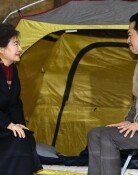Albright briefs Seoul, Tokyo on N. Korea
Albright briefs Seoul, Tokyo on N. Korea
Posted October. 26, 2000 13:59,
The tripartite foreign ministers' meeting of Korea, the United States and Japan held Wednesday was devoted to make a comprehensive assessment on the recent developments in the relationships between South and North Korea and the United States and coordinate policy framework of their three-way cooperation.
The Korean government, acknowledging that the United States¡¯ and Japan's competitive moves for improving relations with the North are not conducive to the inter-Korean rapprochement, stressed that the South-North relationship should be the mainstay, although the North Korea-U.S. and N.K.-Japan relations should be promoted in a supplementary manner.
Foreign Affairs-Trade Minister Lee Joung-Binn said that the three nations reaffirmed that the inter-Korean reconciliation, cooperation and tension reduction are vital for ensuring stability and peace on the Korean peninsula and the Northeast Asian region, and for strengthening global effort for nuclear non-proliferation.
U.S. Secretary of State Madeleine Albright underlined the need for tripartite cooperation, saying that she attended the foreign ministers' meeting even before her briefings to President Bill Clinton on the outcome of her visit to North Korea.
Evaluating that the result of the Albright's trip to the North will contribute to facilitating the progress in the inter-Korean and North Korean-Japan relations, the three ministers shared the view that there might be a need for considerable effort and time for addressing all outstanding issues with Pyongyang.
Albright conveyed the U.S. position that a peace treaty should be concluded between the two Koreas but that Pyongyang seems to decline a change in its stance, it was learned. But she added that North Korean Defense Commission Chairman Kim Jong-Il told her that the South-North Korean exchanges and cooperation should be continuously pursued.
Some North Korean watchers cautioned that the three nations must further strengthen their collaboration lest Pyongyang attempt to promote talks with Seoul on the mutual exchanges and cooperation alone, while pursuing dialogue with Washington on political and security matters.
As for the North Korean missile program, in which Albright has achieved a substantial result, the U.S. and the North are expected to reach a concrete agreement at the forthcoming expert-level talks to be held next week.
Related government officials predicted that at the working-level talks, the two sides would take up the question of U.S. compensation for the North's missile moratorium. Depending on the outcome of these talks, President Clinton's Pyongyang visit will be decided.
Japanese Foreign Minister Yohei Kono, referring to the North Korean-Japan negotiations on their diplomatic normalization scheduled for Oct. 30-31 in Beijing, said that he heard the U.S. secretary of state's explanations on the pending issues with the North, indicating that the upcoming North Korea-Japan talks will be facilitated.
Boo Hyung-Kwon bookum90@donga.com







